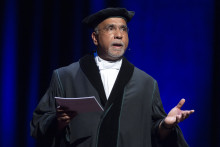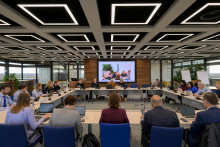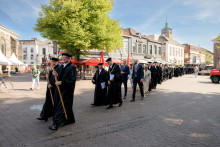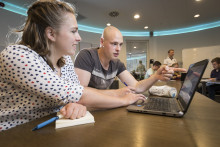'There is no better expression of hope for a university than the hordes of students we welcome to our campus every year', President of the Executive Board Vinod Subramaniam kicked off, after he traditionally observed a moment of silence for colleagues who passed away from the UT last year. 'I'm glad that despite the dark clouds gathering over higher education, we have more students this year than last year.'
TIGHTER SECURITY MEASURES
What stood out during the Opening Academic Year were the stricter security measures. Visitors had to have their bags checked by security guards upon entry. Larger bags were not allowed into the hall. A measure that fits a national trend: several universities tightened security measures for the OAJ.
Steadfast partners
The President of the Executive Board then explained why the UT designated the city centre as an OAY destination for the second year in a row. 'Because of our inextricable bond with the region. Even in difficult times for our university, we step out of our bubble to draw strength from the support of the region, its businesses and its population. They played an important role in our founding and will once again be steadfast partners to navigate us through stormy seas.'
'This university rose from the ashes of the textile industry, like a phoenix from the flames'
The UT that is in financial crisis, the government that is going to cut a billion euros in higher education, the increasing pressure on internationalization: where can the UT find hope? Subramaniam: 'I lie awake at night and I'm sure many of you do too. I take hope from the fact that we are a bunch of scrappy fighters, constantly pushing boundaries. Our region is no stranger to adversity. This university rose from the ashes of the textile industry, like a phoenix from the flames. The city banded together to resurrect itself after the fireworks disaster. I am convinced that our personal and institutional resilience will help us to reinvent ourselves, to make choices – sometimes difficult – and to call on our entrepreneurial creativity.'
Before giving the floor to Jos Benschop, the President of the Executive Board briefly discussed the UT's role in chip technology. 'That's where hope takes me. We can argue – and we do – about our fair share in Project Beethoven, but there is no doubt that our ecosystem at the UT is essential for the vitality of the Dutch chiptech ecosystem.'

The keynote lecture by Jos Benschop.
Keynote Benschop interrupted
UT alumnus Jos Benschop was a few minutes into his keynote, on the importance of semiconductors in food production, mobility and sustainability, when he was interrupted by two pro-Palestine demonstrators. One of the two was stopped by security even before the podium, while the other shouted slogans through the hall for about a minute before he was dragged out of the room. Benschop responded calmly: ‘I am not going to give a geopolitical speech here, but the university is pre-eminently a place for freedom of speech, and we have seen that here', said the UT alumnus. After a musical interlude, Rector Tom Veldkamp closed the OAY with an award ceremony.
Award ceremony at the Opening of the Academic Year
Prizes were also awarded during the OAY: the Van den Kroonenberg Prize for an entrepreneur and graduation prizes for UT students with an impressive thesis.
The Van den Kroonenberg Prize for young entrepreneurship went to UT alumnus Siete Hamminga, who received 5000 euros and a statuette. Between 1994 and 2001 he studied industrial engineering at the UT and founded the company Robin Radar Systems in 2010. This company originated from research organisation TNO and develops radar systems to detect birds, bats or drones, for example. The company now has more than three hundred radar systems worldwide, for example at airports, wind farms and to protect military operations against drone attacks. Hammingas company expects a turnover of more than 50 million euros this year.
Five recently graduated UT students – one per faculty – received a graduation prize worth 1000 euros. On behalf of the BMS faculty, Benjamin Jabold, who wrote a thesis in both psychology and philosophy, won. The winner on behalf of the ITC faculty was Jana Lim. Remarkably, she received the TGS award during the OAY last year. She conducted research into predicting where and when rain-induced landslides will occur. Sem Geerts wrote the best thesis within the faculty of ET. He researched sand dunes as a solution to prevent salt intrusion. On behalf of the S&T Faculty, Loes Kleinsmit won. She researched the chemical reaction between the mineral olivine and carbon dioxide. For EEMCS, Michael Bui won the graduation award. He focused on decision support in hip fracture surgery.









